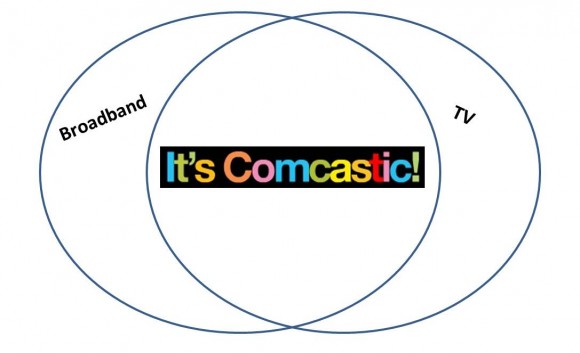
There are so many implications to the proposed Comcast acquisition of Time Warner Cable that it’s a little hard to stay focused on one angle. However, I do want to interject something into the argument that the deal is all about the expansion of broadband. While that’s true, it’s also a simplistic statement. Why? Because broadband is all about TV right now. Think about it. What is driving the ridiculous growth of Internet traffic? It’s video. And what major video source is in the process of shifting to IP delivery? Television. You can’t tease out one side of the business from the other when the financial considerations of both are so intensely intertwined – from how networks are upgraded, to how bandwidth gets allocated, to how service packages are created.
There is one thing I think we’ll have to pay a lot more attention to going forward, and that’s how the major operators (including Comcast-Biggest-Cable-Company-of-All-Time-Warner) decide how to divide up their total delivery capacity between public Internet service and their own managed IP services. To be sure, ISPs depend on being able to market higher Internet speeds and cheaper prices to keep customers (at least in some markets), but I wonder whether in the future there will be less incentive to make public Internet services high-performing if cable companies can make more money from their own managed IP offerings.
“To be sure, ISPs depend on being able to market higher Internet speeds and cheaper prices to keep customers”
Well, sorta. They market higher internet speeds from the customer to their head office.
Internet speeds entering their head office from the wider internet are obscured and unregulated, as we can see from the ongoing peering debacle, of which Comcast is the single worst offender.
So, I can pay FIOS for a high internet speed, but FIOS can give me much lower bandwidth from, say Netflix, by mucking around with peering, even if Netflix is sending FIOS high bandwidth content. (And, again, while FIOS is pretty bad on this count, Comcast is the very worst offender.)
Obviously, assuming the merger goes through, these issues will become worse.
Chucky- Yes, yes, and yes. But the peering issue is more than most people can wrap their heads around at the moment.
I still have my faded T-Shirt from a PSInet conference I attended trumpeting “free peering”. 15 years later and it’s still the issue.
“Chucky- Yes, yes, and yes. But the peering issue is more than most people can wrap their heads around at the moment.”
It’s been getting a lot more attention in the past month or so. Besides the regular Netflix reports, which have been getting significantly more attention of late, this item got a decent amount of pickup.
Beyond peering, as mentioned on the other ZNF Comcast-Takes-Over-The-Internet thread, I think an approved merger leads to bandwidth caps in short order.
I actually don’t know that I agree that we’ll see new bandwidth caps in the near term. Comcast has been pretty generous on that front, and that becomes a public issue pretty quickly. Peering is a much murkier, and therefore probably preferable approach.
“I actually don’t know that I agree that we’ll see new bandwidth caps in the near term. Comcast has been pretty generous on that front, and that becomes a public issue pretty quickly.”
I think you may underestimate Comcast’s political might. And given their increased market share, they will have an easier time ‘normalizing’ things which would have been harder to normalize with more participants in the market.
“Peering is a much murkier, and therefore probably preferable approach.”
You may well be correct. But as the peering issue starts to receive more attention, (as again, it already has quite recently), it’ll be less murky, and there will be more incentive to just drop the mask. When FIOS feels comfortable in admitting they’re deliberately throttling incoming speeds from AWS, we’ve already crossed some kind of Rubicon…
I have no doubt whatsoever that caps will be coming soon, and that the Comcast-approved services such as TV-streaming for sites that require cable subscriptions (ESPN, Xfinity live TV, Comcast-owned NBC, etc) will be excluded from these caps. Any competitor will not be excluded, of course. The caps will be generous enough that they won’t be a hassle for the “good” customers that only watch a little bit of Netflix and stick to mostly the approved services, but costly enough that the customers will prefer to subscribe to Hulu (which being 1/3 owned by Comcast will of course be excluded) rather than Netflix, Amazon Prime etc.
“I actually don’t know that I agree that we’ll see new bandwidth caps in the near term. Comcast has been pretty generous on that front”
Actually, Comcast is the only major ISP to recently test rollouts of bandwidth caps…
“I actually don’t know that I agree that we’ll see new bandwidth caps in the near term … Peering is a much murkier, and therefore probably preferable approach.”
We’re less than a week out, and already, peering / AWS throttling is a constant front page topic! After a long time of murky, the merger sure clarified things amazingly quick.
Gotta think a 50%+ market share Comcast will decide that bandwidth caps are less hassle.